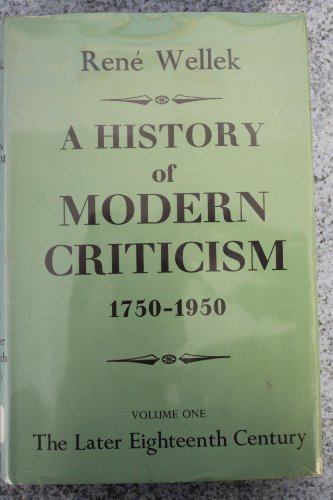A History of Modern Criticism
1750 - 1950
Rene Wellek
BOOK REVIEW

In the literary landscape, few works command respect and admiration as fervently as A History of Modern Criticism: 1750 - 1950 by Rene Wellek. This monumental piece doesn't merely recount the evolution of critical thought but serves as a powerful reminder of how deeply intertwined literature is with the very essence of human understanding. If the realm of literary criticism intrigues you, this book is an essential stepping stone toward grasping its rich tapestry.
Wellek, a towering figure in literary scholarship, meticulously charts the evolution of modern criticism over two centuries, leading us through major schools of thought and influential figures who shaped our perspectives on literature. You may find yourself awed by the journey he unfolds-one that traverses the vast complexities of aesthetics, ideology, and cultural narratives. The debate surrounding interpretations of texts isn't just academic; it lies at the heart of how society perceives itself.
Critics have often hailed Wellek's analytical prowess. His ability to dissect and present intricate arguments feels like a masterclass in thought. Readers frequently express admiration for his capacity to contextualize criticism within dynamic historical frameworks. Some find this exploration breathtakingly expansive; others argue that it remains too ambitious in scope, glossing over nuanced details when plunging into the depths of various critical theories. Yet, it's this very ambition that grabs you by the collar and drags you into the arena of discourse, compelling you to engage with ideas that challenge and provoke.
Look around you: thinkers and creators in varied fields-from philosophers like Theodor Adorno to contemporary authors such as Salman Rushdie-stand on the shoulders of giants who have come before them. Wellek's insights will make you realize that every word penned in a novel, poem, or essay bears the weight of countless critical interpretations. Consider how literary giants such as Virginia Woolf and T.S. Eliot revolutionized narrative forms; their writings are not just historical artifacts but living critiques that continue to resonate.
Wellek's work heralds a time when criticism began to break free from the shackles of pure textual analysis, expanding like a network of interwoven ideas. It awakens the reader to the importance of various philosophical influences, from the romantic to the existential, urging a collective reflection on our cultural heritage. As you wander through the pages, tension builds-a desperate urge to understand not just the past but what it means for us today.
It's essential to remember that Wellek's text reflects the political and cultural upheavals of its time, just as literature itself does. Take a moment to think about the world in the mid-20th century: wars, revolutions, and artistic movements shook the very foundations of thought. How has that shaped your understanding of literature today? This book doesn't provide easy answers; instead, it illuminates pathways to deeper questions that linger like shadows in our minds.
Whether you approach this text as a seasoned scholar or a curious novice, the emotional gravitas contained within its pages ensures it will resonate long after you close it. Readers often report feeling a heightened sense of appreciation for literary discourse, adopting a new lens through which to explore the world of words. Overwhelmed with reflective thoughts, you might catch yourself re-evaluating your own interpretations of literature previously presumed solidified.
In a modern era marked by rapid change and fleeting trends, Wellek's work stands as a bastion of philosophical inquiry, marking not just a timeline but a vital connection between criticism and the broader human experience. Your call to action? Delve into A History of Modern Criticism: 1750 - 1950 and immerse yourself in the labyrinthine corridors of thought that will forever alter your approach to literature and its myriad interpretations. This isn't merely reading; it's an invitation to think, to question, and to evolve. Don't let this opportunity slip through your fingers. 🌪
📖 A History of Modern Criticism: 1750 - 1950
✍ by Rene Wellek
1974
#history #modern #criticism #1750 #1950 #rene #wellek #ReneWellek